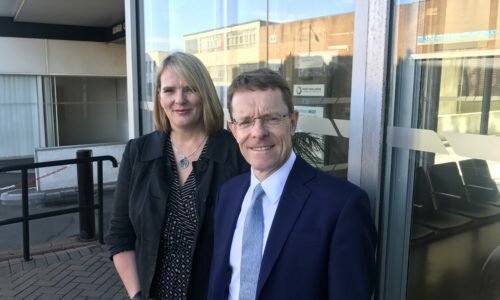
Mayor looks to Shaw up congestion cutting promise
With the 100 day marker in sight, Mayor Andy Street today reveals the headlines of a plan to “bust congestion” and has recruited one of Birmingham city council’s top officers to deliver on one of his biggest promises.
Mr Street has committed to a “step change” in investment in public transport infrastructure to reduce the region’s dependence on cars. The West Midlands Combined Authority (WMCA) has already secured £4.4 billion from Government to improve connections to HS2.
In the shorter term, work is taking place to tackle congestion hotspots across the region and ensure there is greater coordination to avoid disruption.
Anne Shaw will join the WMCA as director of network resilience. She will work with Highways England, Network Rail, the Department for Transport, local authorities and other key players to “ensure transport works are coordinated and congestion tackled.”
Ms Shaw is currently Assistant Director of Transportation and Connectivity for Birmingham and has led the Birmingham Connected transport plan. She is widely regarded as one of the council’s top performing senior officers in what has been a tumultuous few years for the country’s biggest local authority.
The new director of network resilience will focus on the Key Route Network, a number of important non-motorway roads across the region for which the Mayor has responsibility.
Transport currently represents the function for which the Mayor has most powers under the original devolution deal, although he is now looking to add housing and skills powers under Devo Deal II. It is also the area where voters are most likely to notice any tangible changes and reward a successful Mayor at the ballot box in 2020.
In his “renewal plan” which now forms the backbone of his policy approach to the Mayoralty, Mr Street committed to deliver action plans on transport as well as housing and jobs in his first hundred days.
He also promised to:
launch quick congestion busting measures, such as reviewing traffic light timings and roadwork plans on the M6 and other key routes
in his first 100 days as Mayor.
The WMCA recently secured £5.8m of Government funding through the National Productivity Investment Fund (NPIF) to tackle congestion at ten locations across the West Midlands. This investment includes the use of ‘intelligent’ traffic signal technology which will self-adjust to traffic conditions and which will be in operation by April 2018.
The WMCA has already submitted a request for over £40m of further funding to tackle a number of additional congestion hot spots which, if successful, will enable the delivery of over £90m of investment.
Andy Street said:
It is no secret that we have a major issue with congestion in the West Midlands, a situation which is brought into even sharper focus when we have major infrastructure repairs or enhancement which require roads and junctions to be closed.
Clearly, the long-term approach has to involve moving people out of cars and this will require a revolution in investment in rail, buses, trams and cycling. Cllr Roger Lawrence’s work for the WMCA on this as transport lead has been outstanding.
But this will take many years to fully deliver.
In the meantime, this congestion busting action plan will take simple but effective steps to overcome some of the issues that rightly frustrate commuters.
The number one point of frustration tends to be a lack of coordination. At times roadworks appear badly planned and poorly communicated and this is sometimes a fair criticism.
That’s what this will seek to solve immediately as we know future investments in motorway enhancement and HS2 will put even more pressure on the road network.
We’re also working to secure further money from Government to pay for improvements on particular blackspots where traffic gets snarled up every day. Although we secured almost £6m in the last round, this is only the start and we will continue to press the case for more funding.
Anne Shaw joins the WMCA in September with 26 years of experience working closely with many of the partners and stakeholders involved in transport in the region.
She said:
The next five years promise to be challenging ones for our region as the investment will inevitably mean disruption for the public which we need to manage really carefully.
Local authorities and other agencies need to work more strategically to both tackle congestion and minimise the impact of work. I am convinced there is the will to do this and look forward to playing my part.
Similar Articles
The North and Midlands – more in common than divides? 0
When Business Secretary Greg Clark announced that negotiations would start "immediately" on a second devolution
Former MP joins WMCA as Mayor begins next phase 0
The West Midlands Combined Authority (WMCA) confirmed the appointment of “devolution expert” Julia Goldsworthy as
Council: what’s ‘bin’ going on? 0
Has the industrial dispute between Birmingham city council and Unite the union been resolved? Or is
Did you have your say on Birmingham’s health reforms? 0
You might not know this but the people of Birmingham have just missed the chance
Seven ways we coped with the bin strike 0
They think it’s all over… it is now, sort of, for the Birmingham bin strike. There’s ‘bin










